How To Be Attractive
March 5, 2016
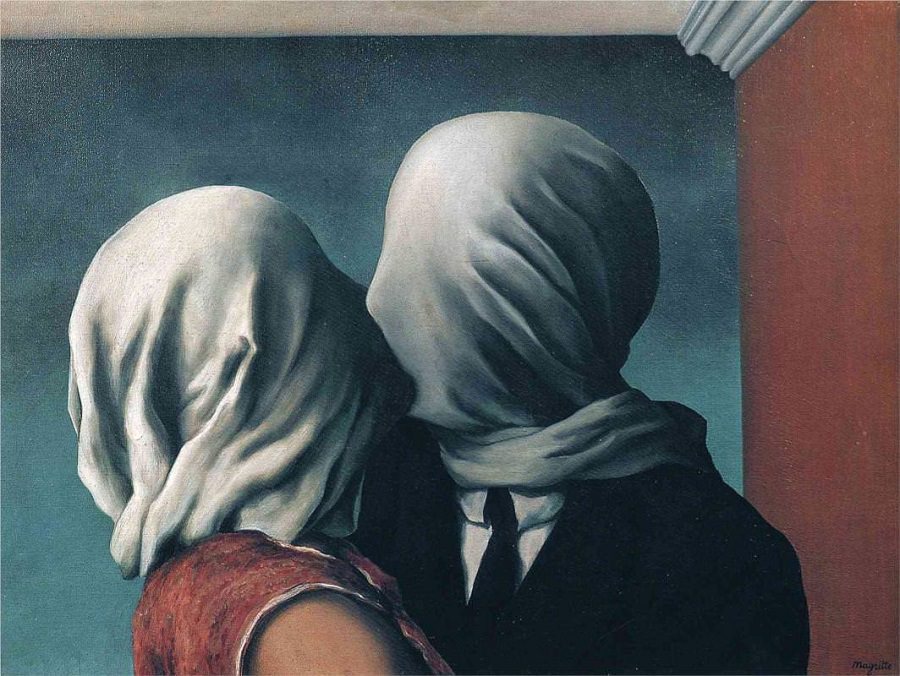
i’ve been looking so long at these pictures of you / that i almost confused map and territory
(trigger warnings: body dysmorphia, porn, anxiety, you. Don’t read unless you’re willing to be offended.)
I.
Americans want to know who’s winning. The stereotype holds that Americans obsess over sex, money, and violence, but America’s fetish is not beach-tan cheerleaders or football concussions, it is SportsCenter. Miley Cyrus is replaceable, a People magazine subscription is guaranteed by the Bill of Rights, and Cash Rules Everything Around Me only because you can’t throw a Roth IRA at a stripper. Americans want to know who’s winning. Sex, money, and violence just happen to be games in which everyone knows the score.
Certainly, s/m/v aren’t the only ones in town—America is the country of Believe It Or Not and One Weird Trick. “Yes, he may have a career, a family, and the respect of his community, but can he do this?” Part for the whole: we carve out niches of power and make them our identity. Even losing becomes a game you can win. “No one understands what I’m going through” = if the game weren’t rigged, I would be the one on top. Flip the board and sulk. “The same thing we do every night, Pinky—complain that we don’t have enough spoons to take over the world.”
But the hunger games are the ones we obsess over. Oscar Wilde: “Everything in the world is about sex except sex. Sex is about power.” Once you understand this, America’s prudish prurience makes sense: the act of sex isn’t important, the scorecards are important. Consider your last breakup: “I know you love me for who I am. That’s why I can no longer trust your opinion.” On TV, Mr. Protagonist walks out of the nightclub with blonde on each shoulder, then scene cut to post-coital sheets and the long exhale. Aspirational without making you insecure—thank God it didn’t show a penis. Paperback erotica doesn’t have to be more explicit than a Downton Abbey episode, and the master/slave narrative, replacing sex with the symbols of sex, is particularly popular among insecure women and men. “He’s more powerful than me, but he still likes me? That’s all I needed to hear,” she thinks, driving to the dorm room qua sex dungeon; meanwhile Sir has trimmed his pubes and taken down his Pink Floyd posterior poster because he’s not sure if it’s offensive and he doesn’t want to kill the mood. I welcome your hatemail. Maybe I’ll start scrapbooking.
Winning and losing are loaded enough that society places a taboo on numbers to keep us from going Highlander. It’s rude to ask someone “what’s your income, IQ, and girth?”, but it is equally impolite to flip your own baseball card. Why? Because size, class, and Int are considered unchangeable markers of value, and plausible deniability vanishes when numbers get involved. Thus, one of you is better and always will be better, which means the guy who loses at sex and money has only one path to redemption. Let’s hope your summer camp aikido pays off. [1]
The measurement obsession isn’t unique to America, of course. It’s part of any individualistic society, i.e. “The West”, i.e. “the dystopian cyberculture that all developed nations asymptotically approach.” But America is definitely at the far end of the spectrum. And before I go full Noam on this mofo, I’ve got to give credit to individualism. Do you know what happened to Tibet? They were peaceful, they were selfless, and they got totally crushed. Whereas America won the 20th century: best movies, best music, best military, best fast food, best athletes, and we’re the ones giving out the awards. Measurement leads to competition, competition leads to capitalism, and the starting line ain’t fair but the race does pick out winners.
On the other hand:
Sometimes I just feel really ugly and it makes me so sad. There’s brief moments when I think, “Hey, I’m not that bad,” but these moments seem to few and far between. I don’t know what’s wrong with me. I remember being in middle school or maybe early high school and spending the entire day crying at my house because I was upset over a certain part of body. I missed out on going to a concert with my sister and her friend. I obsess about everything from the smallest wrinkles on my forehead to my gums to my cowlick to my eyebrows to my acne to my cellulite. These are things that aren’t even a big deal. For example, I’m skinny and have the slightest cellulite under my butt. No one has ever commented on it negatively but I obsess over it. It’s unhealthy but I don’t know how to change the way I feel about these things which are always going to be a part of me. I find imperfections in every thing I do. I hate that I’m never going to be the prettiest or the smartest or the funniest. I don’t know why anyone finds me attractive. I see girls every single day who are ten times prettier and cuter than I am. Why would anyone find me attractive next to these girls? I wish I could love myself like I deserve to be loved. [From a forum, somewhere.]
For every winner, there are many, many, many people who feel like losers. Example: body dysmorphic disorder, which occurs in about 2% of the general population but is much more common in certain groups, e.g. 11-13% of people with social phobia. I don’t know if the individual quoted above has BDD, but for every person with “excuse me, I need to stare at the bathroom mirror” dysmorphia, there are a dozen subclinical cases: people who obsess over weight, height, muscle mass, skin tone, acne, vocal pitch, posture, alopecia, and the thousand other difficult or impossible to change traits that come with being human.
“This is so depressing. I can’t stand how the media perpetuates unrealistic standards of beauty.” I wish it were that simple, but I assure you, if Disney, NewsCorp, Time Warner, and Viacom all did a slow dance with antimatter our unrealistic standards would not magically become realistic. The media isn’t blameless, but it tells us what we want to hear. If the media disappeared, we would still want to hear the same things. Type in “pretty girls” on the Tumblr search bar—do you think those “unrealistic standards” are going to disappear? And if you’re looking for a grassroots, sex-positive environment, look no further than reddit’s /r/gonewild, where young women insert objects into their rectums, take selfies, add personalized captions (“I’m stripping [f]or you, gonewild”) that give men a flash of less-loneliness as they dilate their pupils and one-hand-type “cum”, to which the women reply in lower-case font: “it feels good when you like me, please don’t stop liking me.” But don’t hate the player, hate the crushing emptiness of the human condition. Exhibitionists and voyeurs were around before papyrus, and if body image is a modern problem it is only because there are more images of bodies. No matter what Kendrick says, dick is pretty much free. Men are constantly aware that they are replaceable, women are constantly reminded that they are inferior. Most people feel inadequate most of the time.
I get obsessively down on myself, and hammer myself into the ground so hard that there is no way of possibly getting back up. I tell myself I am too anxious to be in charge of anything or have any real responsibilities, and that if I did, I would just freak out and ruin everything and get fired. This attitude basically showed in my job interview, when they started throwing responsibilities at me and I just said “I don’t know if I’ll be able to do that,” and had no idea how to respond to any of it. I couldn’t say "Yeah, I’m capable of that,” because I don’t believe I am and I couldn’t lie. Clearly the wrong things to say, but I was just so intimated and nervous. I left the interview, went to my car, and broke down and cried for almost an hour. I just feel like my anxiety is going to destroy any chance I have of ever accomplishing anything. [From a forum, somewhere.]
No catchphrase exists that can mend the feeling of inadequacy. You can try—“All of this stuff is subjective, it doesn’t really matter”—but at some level, it does matter. We care about measurement and any trait can be measured. The scale starts at 0 and it goes to 10. You are not a 10. And so, the argument goes:
We all fantasize of being beautiful and with a beautiful person.
People who are less than 8/10 usually manage to find someone: a 2 with a 2, a 4 with a 6, a 6 with a 7, etc.
All of these sub-8 relationships remind me of playing “house” as a kid: you play Mommy and I’ll play Daddy. Let’s pretend.
When you’re taking your date out for a fancy dinner, even if you are a 7 with a 7, it is role play. When you get your dick sucked in your car down by the lake and think you’re part of some hot sexual act, it is not, you are pretending. When you get photos taken together, deep down, you’re trying to convince yourself that you’re the hot couple which you will never be.
We make each other feel better by allowing each other to pretend to be the sexy people that we are not. 8+ people do it for real. [/r9k/]
I reject this. Some people have it easier than others, but beauty is an not immutable truth. For the rest of this essay, that is what I intend to prove.
II.
Let’s play the rating game.

This analysis of speed dating events found that “60% of the predictive power comes from the group consensus and 40% of the predictive power comes from deviations from the group consensus.” I plugged in the numbers of a few threads on /r/rateme and found slightly more generous results: each girl’s mean attractiveness fell between 5.0 and 8.5, and the standard deviation of any one girl’s ratings was ~1. (i.e., if you’re a 7, 16% of people will consider you 8+ based on picture alone.) I’m aware that my methodology is Lehrer-esque, and I bring it up only to introduce two uncontroversial points:
-
Notions of beauty are fairly consistent within a culture: there is broad consensus about “hot” vs. “not.”
-
However, there are meaningful differences in taste, even amongst the sample of “people who post attractiveness ratings on reddit.”
Cool? Moving on.
Why do we agree that some people are more attractive than others? According to Dr. Gad Saad, the associate editor of Evolutionary Psychology:
It is undeniable that indeed there are an endless number of cultural definitions of beauty. However, these are largely inconsequential, when compared to evolutionarily relevant metrics.
Symmetric faces are construed as more beautiful than asymmetric faces in all cultures (irrespective of the race of the person being evaluated and the race of the evaluator). You can visit Bedouins in the Middle East, the Yanomamo in the Amazon, and Inuits in the Canadian north, and they will all agree as to who is or is not beautiful (based on facial features). Clear skin is a universal preference. Certain morphological features that connote masculinity (square jaw) or femininity (high-cheek bones) are universally preferred. Rotund Rubanesque women, heavier women preferred in Central Africa, and catwalk thin models, while varying greatly in terms of their weight, all tend to have hourglass figures that correspond roughly to a waist-to-hip ratio of 0.70 (although cultural settings can slightly alter that preference). Babies who are insufficiently cognitively developed to be influenced by socialization gaze at symmetric faces for longer periods than they do at asymmetric ones. I can provide numerous other examples that support the universal components of beauty but I suppose that you get the point. (Psychology Today)

That’s not an ad hominem, he did it to himself.
Arguments that seek to explain the nuances of human behavior via natural selection are almost always misguided. Dr. Saad’s argument is not the exception. I do not dismiss evolution; rather, I argue that evolution has had powerful effects way upstream of any one trait. Hardware keeps us alive, but our lives are run by software.
Case study: Dr. Saad states that symmetrical faces are universally preferred over asymmetrical faces. This is almost true, but…
…when faces were divided down the middle two perfectly symmetrical faces could be created from the two halves, a “left face” consisting of the left half of the face and its mirror image, and a “right face” constructed in a similar manner. These two perfectly symmetrical faces could then be compared with the unaltered face. In all cases, except in the most unattractive original faces, the unaltered face was rated as more attractive than either of the perfectly symmetrical faces. (Wikipedia)
In most cases, then, artificially-induced symmetry does not prettify a face. So why do we find symmetric faces attractive?
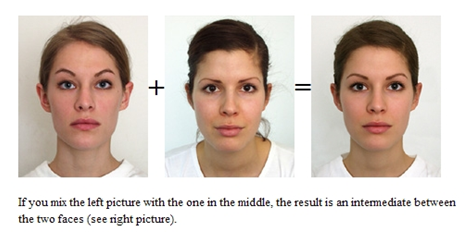
Faces with “average” features tend to be extremely attractive, e.g. Jessica Alba, if you’re amnestic to the Fantastic Four remakes. The above picture is an extreme example (results may vary), but experiments have found that number of faces averaged positively correlates with attractiveness.
…they selected photographs of 192 young male and female Caucasian faces; each of which was computer scanned and digitized. They then made computer-processed composites of each image, as 2-, 4-, 8-, 16-, and 32-face composites, averaged by pixel. These faces, as well as the component faces, were rated for attractiveness by 300 judges on a 5-point Likert scale (1 = very unattractive, 5 = very attractive). The 32-composite face was the most visually attractive of all the faces. (Wikipedia)
Hence, don’t mess with the sliders on the character creation screen. We are not programmed to seek symmetry or clear skin, evolution just says that normal = good. How do we know what’s normal?
Fifteen minute-old neonates show no preference for attractive faces over unattractive faces. But 72 hours later they already stare longer at faces judged by adults to be attractive than they do at unattractive faces. This rapid development of an appreciation of facial beauty (as judged by adults) might be explained by the fact that an averaged face made of 32 faces looks almost indistinguishable from any other 32-face averaged face even when they are created from a completely different set of individuals. It is thus possible that an average of only 32 facial exemplars is sufficient to approximate the population mean, and thus produce a prototype that is shared by almost everyone in a community. (Wikipedia)
This directly refutes one of Dr. Saad’s claims. See also: “Three-month old infants, but not newborns, prefer faces of the same race.” We form a model of the world and find comfort when the world conforms to our model: allegory of the cave, natch. “I loved the new Star Wars!” Me too. Best Disney movie I’ve seen in a while.
Waist-hip ratio is also a bit messier than Dr. Saad implies. American men do prefer a low waist-hip ratio (around 0.68), at least when looking at 2-dimensional figures, although note that this is close to the mean WHR of young American women (0.72–0.73). In comparison, young Hazda men prefer a WHR of 0.78, close to the mean WHR of 0.79 among young Hazda women. Matsigenka and Cameroonian men also prefer their women with a little extra, and I must point out the hefty debate regarding BMI vs. WHR as acronymized predictors of hotness.
But despite a lack of true universality, low WHRs are preferred in most of the world, and this preference pops up in surprising places, e.g. among congenitally blind men. Why?
The researchers showed 511 Brisbane schoolchildren, aged six to 11, drawings of men and women with varying waist-to-hip ratios and body-mass index, a measure of bodyweight as it relates to height.
"We found that the preference for [a waist-to-hip ratio of] 0.7 in women and 0.9 in men emerged strongly around age 10 and 11,” Slaughter said.
The bias wasn’t evident among the five and six-year olds. But they showed a preference for thin figures, which probably most closely mirrored their own shape. (ABC, actual study here.)
Observation: no one cares about secondary sexual characteristics more than high schoolers. In college, waifish tumblrgirls and late-blooming tumblrboys do pretty well; in high school, they are ignored, hence Tumblr. Why are high schoolers so superficial? If you recall, when you first discovered the thrill of senpai noticing you, it was the most exciting thing ever. So you stopped paying attention in class and started scanning for qts. Who was willing to flirt back?

Puberty prompts you to seek out a mate. Puberty’s dark magic also lowers the WHR of women, increases the shoulder-hip-ratio of men, increases bust size (♀), musculature (♂), penis size (♂), cheekbones (♀), and jawline (♂), all stereotypically attractive traits. Even for a congenitally blind man with an allergy to pop culture, a first makeout session will involve lots of breast caressing, booty squeezing, and running of hands from narrow waist onto broad hips. The map is thus written: wide hips = good chemicals, “even better than videogames!” Puberty onsets earlier in girls than boys, so a girl’s first boyfriend is likely to be taller, older, and more competent than the boys her age = same principle. Culture acts as a positive feedback loop for these preferences, but it is not necessary for them to emerge [2].
With luck, this explanation will annoy people on both sides of the nature/nurture debate. Evolution tells us to form prototypes, but it says nothing about how those prototypes should appear [3]. Forget all the traits mentioned above, if insectoid aliens landed on Earth and spoke English, humanity would be DTF within a month. (“Bro, she’s got legs like you wouldn’t believe.”) On the other hand, many socially constructed preferences are deeply embedded and unlikely to change. Obesity has not been deemed unattractive by the SoulCycle Illuminati. Obesity is unattractive because your cute lab partner is a potential mate, while her pre-gastrectomy Mom is not.
None of this is terribly actionable. You’re more-or-less stuck with your facial structure, and it’s no secret that deadlifts and moisturizer will make you more appealing. So why does this matter?
Because the same process that is responsible for our similarities in taste accounts for our differences. You can take advantage of differences.
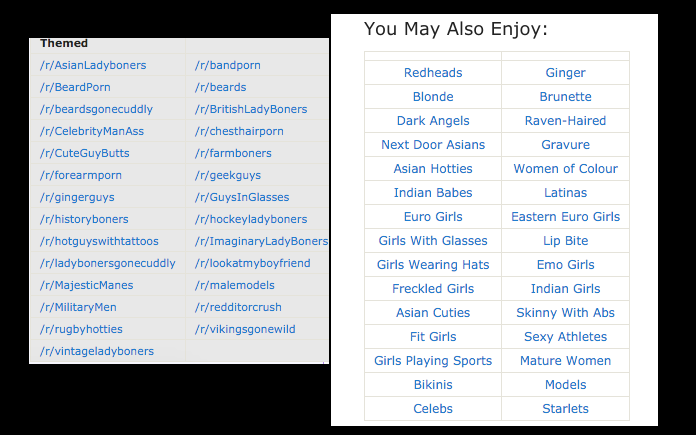
III.
We form our prototypes of “nice to look at” during early childhood and “nice to stare at” during puberty. Not coincidentally, these are two developmental periods during which our pattern-matching is turned up to the max.
In the beginning, you cry and you are fed. In infancy and childhood, we learn what gets us love. “Love” is perhaps the wrong word—after all, we’ll throw a temper tantrum if it gets us attention. More than kindness, we crave connection. We need someone to acknowledge that we exist, to understand us as human. Without that, we are alone.
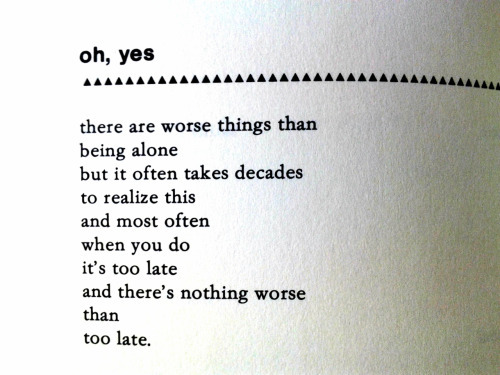
I’m going to use the word “love”, though, because whatever definition you create for that feeling (“the opposite of loneliness”) is the one you’ll use for all future relationships: romantic, platonic, and parental. In childhood, we form a prototype of what love looks like and we learn how to get it.
During puberty, we must become powerful. Power is your ability to control the universe, the high of power comes from leveling up. Power exists from birth: as much as curiosity, power is what motivates us to stand, walk, and run [4]. Even social power—“status”—exists before puberty. Poor kids and younger siblings are acutely aware of this, since they have to kick and scream for every advantage. But puberty is when status games become mandatory, and if you refuse to play, you are low status. Why puberty? Because we’ve got plenty of food, air, and water, but sex is still a finite resource. “It shouldn’t be.” Even if it wasn’t, love is a finite resource. “It shouldn’t be.” Hate to break it to you, but there are 24 hours in a day and 28,000 days in the average life. Whatever criteria you use to pick companions, these criteria will become the new foci of status. The game may not be zero sum, but it doesn’t sum to much.
In puberty, we learn the rules of status games and pick a strategy to maximize gain or minimize loss. We learn how incredible it feels to level up, to be valued and desired. We a prototype of what power looks like and we learn how to get it [5].
This essay is titled “How To Be Attractive”, which means that you (male) expect me to answer “What do women want?” But it’s no different than what men want. We want to feel powerful and we want to feel loved. These twin desires are the yin and yang beneath all interaction: both are necessary for happiness, neither is sufficient alone. The problem of human existence is that power is always relative, between strong and weak, while love is felt in moments of mutual understanding, of equality, so that in any one microsecond of choice the forces driving our lives are inextricably opposed.
However, the notion that love is “good” and power is “bad” is the greatest error of liberal philosophy. It’s an American idea, part of our obsession with objectivity and winning. It’s a way to score morality: whoever causes the least harm is the better person. We don’t care about doing Good—no one can agree on “Good” anyway—we care about not doing Wrong. Insert comparison to our medical and legal systems here.
Consider a group of 20-somethings trying to decide what to eat for lunch. Korean? Mexican? Shake Shack? They look at their phones, scroll down Yelp, and, every minute or so, one of them makes a bold proposition: “We could do sushi, I guess. I mean, if you guys think it’s a good idea.” No one is willing to lead, because what if it turns out the sushi place is really expensive? The leader would have caused harm to his constituents. He would be a failure, a bad person, and, justifiably, his followers would shun him. Sure, there’s an opportunity cost to standing around in the parking lot outside work, but that cost is borne by everyone. His place in the standings is unchanged.
If you are a strict believer in primum non nocere, you should be childfree. After all, parents always fuck up their kids. How could they not? The more power you have over someone, the more likely you are to harm them, and parents are gods in the blurred eyes of an infant. If you are truly scrupulous, you should be polyamorous: no risk of infidelity, no risk of being too boring, can’t renege on no commitment, no need to ever fight. And, of course, you should be asexual. Sex is messy and confusing—someone could get hurt!—but Astroglide makes it so the thenar muscles don’t chafe, and a bit of asexual heteromasturbation will kill whatever libido is left in your blood. All that would be fine—do what makes you happy—except you’re not happy, you have a smoldering fury in your chest and it shows in everything you say. You find people to be stupid and selfish and predictable and yet they’re still scary. Why is that? What are you missing? You comfort yourself: “I may not have X, but at least I have civilization.” Civilization isn’t enough to quench the rage, though, so you fantasize about joining the Dark Side, although you never will, it requires a set of skills you do not have and honestly you would not like it, it is lonelier than you think. “Are you making fun of—?” I’m making fun of an archetype. If you’re seeing it, it’s for you.
That’s the charitable view.
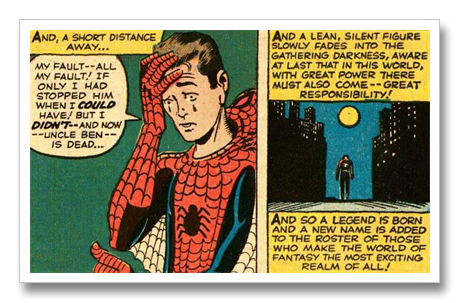
It’s hard to separate the love of power from the power of love—they talk when you sleep, you know. The charitable view is that people eschew power out of a strict but misguided sense of morality. The less charitable view is that becoming strong is difficult, while saying that you love everyone costs you nothing. Being weak is actually protective: as long as you give people what they want, they won’t bother to hurt you [6]. Of course, love without power doesn’t heal the sick, give aid to the needy, or satisfy a partner, but you remind yourself that if you had power, you’d always do the right thing. Alas, you don’t, because of society. Oh well. Start a Twitter trend about it. “Alpha” and “beta” are silly ways to describe social status, but they have meaning in statistics: your alpha is your chance of a false positive error, your beta is your chance of a false negative. I’m not saying you should inject HGH and howl “cuck” at the moon, but there is a way to be confident that pays heed to the greater good.
Not only do érōs and thanatos lack intrinsic moral weight, they are easily tricked, triggered, hidden, and hacked. This is important, so I will give a few examples.
One, mentioned earlier, is BDSM. The key to understanding kink is that both the dom and the sub get to feel more powerful. The dom’s benefit is obvious: the roleplay allows him to pretend at strength. It is not morally equivalent, but domestic abuse comes from the same place. The sub’s power is twofold. First, he avoids any risk of failure and subsequent status drop. (“You’re just lying there?” “I’m being submissive.”) Second, the dom’s willingness to break social norms means that the sub is worth it. “You’re a pathetic tiny-dicked sissy boy [but you’re so great that I’m spending energy on you anyway.]” The dom/sub dynamic is present in most vanilla sex as well: the active partner’s job is to grunt “I’m working really hard!”, the passive partner’s job is to moan “I’m really into it.” I don’t need to point out where the gender division falls in practice. That sounds mean, but no hate, do what makes you happy; just be aware that anyone claiming that erotic choking subverts the patriarchy is trying to sell you a memoir. I propose: “Just Kink About It: How I Reclaimed My Sexuality From The Male Gaze And Lost 30 Pounds In 30 Days.” If that doesn’t go viral, there’s always academia.
We prefer to date high-status people because this counts towards our score, makes us powerful by association. “He has a hot girlfriend, so he must be doing something right.” What constitutes status, however, is culture-dependent. The hobbit that seduces Marnie in Girls would not register as an alpha male in 13th century Mongolia, and Genghis Khan would come off a little gauche in 21st century Brooklyn. (“He’s confident, sure, but his politics are awful—I don’t think he understands imperialist systems of oppression at all.”) If you can’t tell whether someone is powerful, you look for an objective score: if she’s slept around, that means people other wanted her, which means she’s worth wanting [7]. In response, women who want to feel desirable have to look promiscuous, even if they aren’t. (See also: camming.)
Love is just as exploitable. Feeling loved = feeling understood. Children and puppies are lovable because they are simple; neotenous faces appear cute because they are hyper-expressive. The problem arises when synapse-challenged college kids adopt a puppy, spoil it, and get tired of caring for something that is no longer cute. The greater problem occurs when these people have kids. The obverse: people with dementia, retardation, or even a language barrier appear, in some horrible unavoidable way, inhuman. But time brings understanding: as you learn someone’s personal language, you grow to love them, it is unavoidable. (See also: Stockholm Syndrome.) It is possible to love someone based on nothing but their pattern of intubated breaths. It is possible to love someone whom you no longer even like.
Finally, the feelings of love and power, the squirts of oxytocin and dopamine and friends into junctions between cells, come from velocity, not position. All feelings are subject to the hedonic treadmill: you build up a tolerance. Hence new relationship energy, hence /r/deadbedrooms, hence why kings still crave power, and hence the allure of emotionally labile relationships. If your gf screams that she hates you and then does a 180 and professes undying love, your brain will process this as: “I’m so great, I can convince even my haters to love me.” Boom, dose up, and you can do the same for her. Complaining about a “crazy ex” is like complaining that the coke made you too jumpy. You get what you pay for, pal. Caveat emptor.
Despite my mild distaste re: love, power, sex, human beings, I don’t want to harsh the vibe too much. Love can be beautiful, power can be noble, sex, I’m a fan, and all three of them make for great television.
However, if you want to be attractive, you need to understand the ways in which our prototypes are blind. Don’t hate the player, hate the lazy programming of a 200,000 year old meme generator. And the games of love and power have one glaring defect: it’s easy to win if you know how to act.

IV.
Our prototypes are constructed from the narratives we observe. Perhaps in Babylon these narratives were learned through real world experience, but this is the 21st century, schizoid man. Lived romance accounts for 0.1% of our exposure to boy meets girl. The rest comes from pixels.
Try this: close your eyes, and imagine a perfect date with the perfect girl. “She has kind of a cute hipster aesthetic…we’re holding hands…it’s the fall…she’s wearing a sweater…” Have you ever done that? Where did you get that image? Isn’t that an ad for Cialis?
Our prototypes for love are broad—the average of any 32 faces looks about the same—and broadly agreed upon, since parent-child relations and the Golden Rule are fairly consistent across cultures. Puberty is more variable than infancy, and correspondingly, power is narrow and culture-dependent. Sure, the details of your taste can change and expand—you liked Spike in Buffy, now you’re into the guy from Teen Wolf—but the central rules of your prototype (“I like nonthreatening bad boys”) are impossible to alter without becoming a different person. Most of us just switch pages in the Monster Manual.
The influence of cultural narratives cannot be overstated. When someone shows you a picture of an Oppressed Person With Striking Eyes and says “Isn’t she beautiful?”, you’re like, “Yeah, but I’d have to really concentrate if I wanted to masturbate to her. Maybe I could pretend she’s in a sorority?” Pavlov was right: eventually, you can get off to the winky face alone. All porn works this way: in a title like “Big Titted Asian Teen Plowed By Massive Cock”, “by” is the only word that’s not an identity marker, and luckily some enterprising soul invented hashtags so soon we can dispense with prepositions completely. Nota bene that I hate everything.
“Okay, but in real life we don’t have a search function.” Really? Consider: “I saw her from across the room, and I immediately fell in love.” Fell in love with what? “She had these big thick-rimmed glasses…and an impish smile…and we’re holding hands, and it’s the fall…” Right, part for the whole. She had big glasses, so you typecast her into the story you’ve run through your head a thousand times, the story repetition has lodged in your unconscious Id. She had big glasses, so she was the type of girl you could love. “No, you don’t get it—she looked like the girl of my dreams.” Exactly.
Of course, she knows this, which is why she chose the glasses.
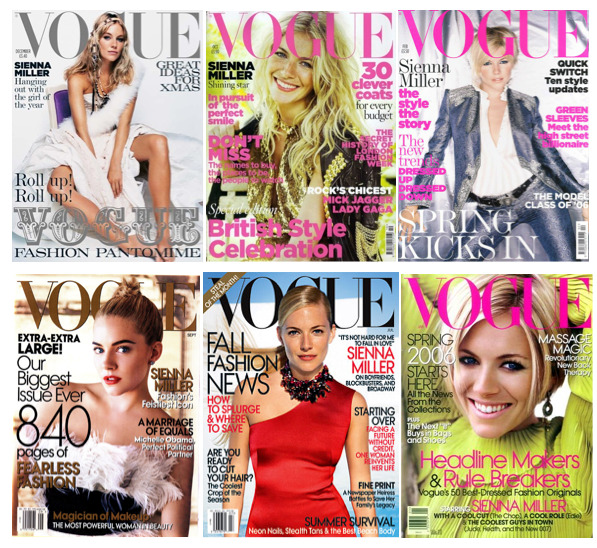
This is how fashion works. Unfashionable people can be too flashy or underdressed, but in both cases, the question is the same: “Who are you supposed to be?” A well-dressed person is essentially wearing a costume: if you put an ugly guy an expensive suit, his face is irrelevant, he becomes the suit. Strippers use a similar technique. “Geek chic” accentuates nerdiness (glasses, bow-tie, buttoned-up shirt), unattractive nerds downplay it (brown hoodie, loose jeans, hobo beard). Wearing half Ed Hardy and half Lululemon = weird, but picking either half will make you attractive…
…to poor souls who are into Ed Hardy or Lululemon. Let’s be clear: it is impossible to be attractive to all of humanity. Race is a rule-out criteria for many people, physique for many more. Classic post-coital conversation: girl says “I don’t think I’m mysterious enough to be really attractive,” boy says “I don’t think being mysterious would make you more attractive.” Both are right: mystique makes you attractive to more people, but specialization makes you more attractive to those who have the relevant prototype [8].
In this respect, behavior is no different than appearance.
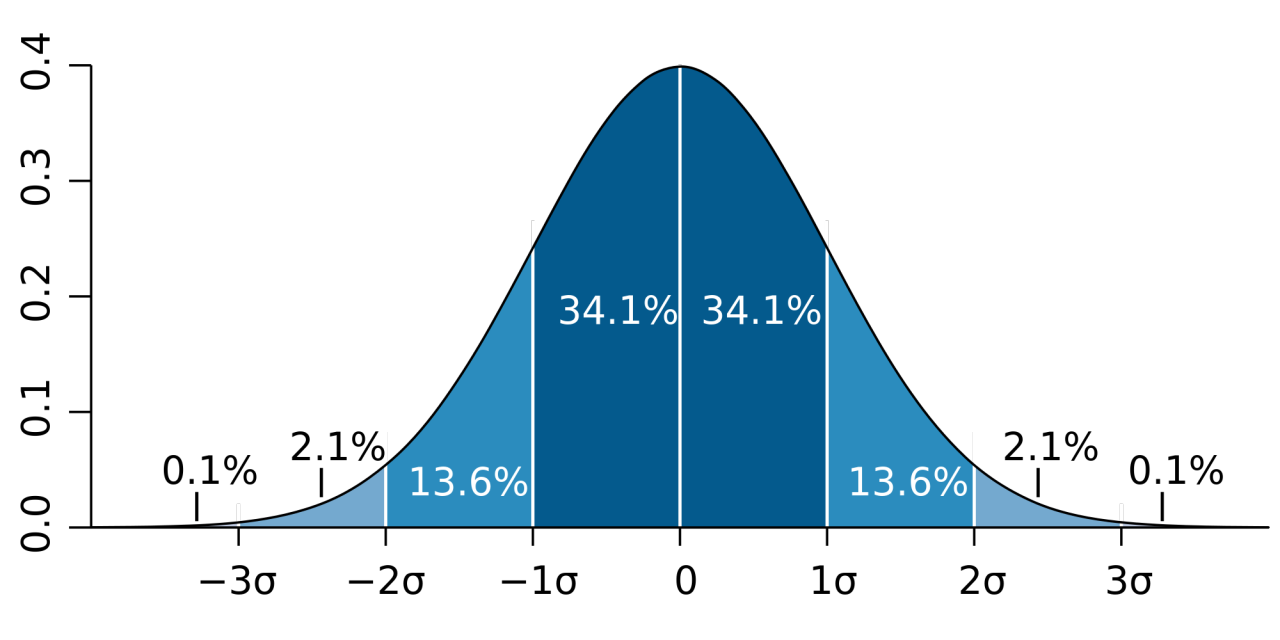
In this essay, I argue that subcultures form (with labels, identities) because people at the fringe of a larger culture want to be around similar minds. This makes sense: people who differ vastly from you a) won’t understand you, so you won’t be lovable, and b) won’t value your particular set of skills, so you won’t be powerful [9]. Slate Star Codex has the right idea with his cellular automata model of fashion, although his version is a little group-selection-y for my tastes. The bourgeoisie would never confuse Richie Rich in a Wu-Tang shirt for an actual poor person, but neither would poor people. Status is local, not global; convergent evolution just happens when you’re trying to look slightly better than everyone else in the room. n+1 theory of status: you have to be close enough to be recognized as “playing the same game”, and then you have to win. Hipsters look the same from a distance, but any hipster will tell you the ways he’s post-hipster. “I think On Avery Island is the superior album.” Seek professional help. We need the outgroup for our Two Minutes Hate, but most of our day-to-day battles are against the ingroup. To quote a friend: “Wars aren’t less common. They’ve just gotten more civil.”
Once you start watching for status battles, you will find them.
Mrs. X: I had a nasty turn last week. I was standing in a queue waiting to go into the cinema when I felt ever so queer. Really, I thought I should faint or something.
[Mrs. X is attempting to raise her status by having an interesting medical problem. Mrs. Y immediately outdoes her.]
Mrs. Y: You’re lucky to have been going to a cinema. If I thought I could go to a cinema I should think I had nothing to complain of at all.
[Mrs. Z now blocks Mrs. Y.]
Mrs. Z: I know what Mrs. X means. I feel just like that myself, only I should have had to leave the queue.
[Mrs. Z is very talented in that she supports Mrs. X against Mrs. Y while
at the same time claiming to be more worthy of interest, her condition more severe. Mr. A now intervenes to lower them all by making their condition seem very ordinary.]Mr. A: Have you tried stooping down? That makes the blood come back to your head. I expect you were feeling faint. [Keith Johnstone, Impro]
Status is not something that you are, status is something that you do. In the above conversation, status is mostly primum non nocere: the players compete to see who can self-efface most creatively. A woman once told me that her bestie would introduce the two of them as “sassy ladies,” “since she knows that she’s the sassy one.” Close-but-not-that-close girls squeal equally loud when they see each other because they’ve reached the endgame of a Cold War of friendliness. When a party host you barely know says “Heyyyyy! Glad you could make it!”, he’s not doing it to be nice, he’s pissing to mark his territory. Either accept low status or reframe the battle to focus on your skillset. Mockery works by discounting the game that the other player wants to play, hence the ultimate comeback: “Nyaah nyaah nyaah! That’s what you sound like.” “Oh, like this blog does, when it’s not disjointed insight porn.” Aww. They grow up so fast.
Status is a skill. It takes practice. What you may not realize is that you practice even when you’re not trying. Impro again:
My belief (at this moment) is that people have a preferred status; they like to be low, or high, and that they try to manoeuvre themselves into the preferred positions. A person who plays high status is saying ‘Don’t come near me, I bite.’ Someone who plays low is saying 'Don’t bite me, I’m not worth the trouble.’ In either case the status played is a defence, and it’ll usually work. It’s very likely that you will increasingly be conditioned into playing the status: you’ve found an effective defence. You become a status specialist, good at playing one status, but not very happy or competent at playing the other.
Since status markers differ across social settings, practice brings skill at playing a given status in a given setting, i.e. a particular character. We are more specialized that we realize, and practice makes you better at being who you already are. “I spend hours refreshing the same three websites and I don’t enjoy any of them.” Seems reasonable. You’re playing to your strengths.
Which brings us back to the Deschanel Doppelgänger in the coffeeshop: one look at her predicts 25% of her personality. She has a Macbook Air, thick glasses, and a floral dress: for some reason, I doubt she’s voting Cruz 2016. She unconsciously holds her features in line with her default mood: bored, shy, bubbly, bitter. So you walk up to her and say hi and within ten seconds she knows 50% of you, or at least the person you will be around her. First date will put it up to 90%. There are an infinite number of details for the two of you to share, but the name of her childhood stuffed animal has no predictive power, while the way she pauses and inhales before each sentence tells you exactly her insecurities. Put another way: once you have your first fight in a relationship, you know how every other fight will go.
With the exception of fixed bias, e.g. racism, first impressions are usually correct. Why? Because we work really hard to make them correct [10]. Consciously or not, we dress a certain way, claim certain beliefs, and enjoy certain things, so that when people look at us, they will instantly know: “She has levels in that shit.”
But what if you’re losing at all the status games? What if no club will have you as a member? How you can find people who value you for being you?

Take note: this is called “crowdsourcing the superego”, and it’s going to be the hippest trick of 2016. “Everything Awful I’ve Ever Done: A Play In Five Acts.” 90% of people are horrified, 9% don’t care, 1% think you’re a legend, you take solace in the 1%.
It is thus almost tautological that America’s sweethearts are actors and actresses: they are the faces we see the most. It helps that the media chooses characters we can readily understand—cartoon features, 2D personality—but even if it didn’t, fame is self-reinforcing. Pop culture creates the null hypothesis. If you hear a story enough you are forced to define yourself for or against, and either answer spreads the brand. It’s kind of perfect that Kanye and Kim are America’s vogue icons of masculinity and femininity, since both of them are famous, in large part, for being famous. The word you’re looking for is “meme.”
But that’s only half of it: performers know how to tell a story. If you know the ebb and flow of narrative, you can self-insert into it and make yourself a prototype.
“And you make people nervous, young man,” she said—most equably, for her. “You either take to somebody or you don’t. If you do, then you do all the talking and nobody can even get a word in edgewise. If you don’t like somebody - which is most of the time - then you just sit around like death itself and let the person talk themself into a hole. I’ve seen you do it…You can’t live in the world with such strong likes and dislikes.” (Franny and Zooey)
This is narcissism. “If she’s not going to like me, I won’t bother. If she seems interested, I’ll throw my manifesto at her and hope that it sticks.” How much time each day do you spend rehearsing your sad-but-beautiful story? What’s your favorite song to listen to while you do it?
The advantage of this strategy is that you will never be rejected. If a date doesn’t like you, they couldn’t handle you at your worst, so they don’t deserve you at your best. And it’s easier: you never have to try at being tough, you never have to try at being witty, in fact, low effort is probably better—you don’t want your partner to get unrealistic expectations. Anxious women do this: “My father died when I was young, ha ha. I’ve never felt good enough, ha ha. I’m such a bitch, ha ha.” This would be mean if it wasn’t quoted verbatim.
The disadvantage is that you will be forever unhappy. If you don’t start out trying your best to impress your partner, you will never try your best to impress your partner. Next thought: “If she likes me when I’m being a loser, she must have something wrong with her. Maybe she’s ugly?” Soon you’re half-hoping she cheats just to confirm she’s worth wanting. Time for an open relationship that neither of you will act on. You might not break up right away. These relationships can drag on for years, with one partner hopelessly in love, the other too oxytocin-addicted to pull the trigger, but dreaming that someone better will arrive, someone with whom he will fall head-over-heels in love. Which will never happen: your cracked-open chest demands unconditional love, and you don’t want unconditional love, it’s too easy, you want a challenge, a test, something you can point to and say “THIS IS IT! THIS IS IT! THIS IS THE PROOF THAT I AM A VALUABLE HUMAN BEING!”
I don’t blame you. Americans like to know who’s winning.
V.
Why are nerds unattractive?
I know a lot of people who were nerds in school, and they all tell the same story: there is a strong correlation between being smart and being a nerd, and an even stronger inverse correlation between being a nerd and being popular. Being smart seems to make you unpopular.The key to this mystery is to rephrase the question slightly. Why don’t smart kids make themselves popular? If they’re so smart, why don’t they figure out how popularity works and beat the system, just as they do for standardized tests?
He explains:
[Nerds] don’t realize that it takes work to be popular. In general, people outside some very demanding field don’t realize the extent to which success depends on constant (though often unconscious) effort…Likewise, popular isn’t just something you are or you aren’t, but something you make yourself.
The main reason nerds are unpopular is that they have other things to think about. Their attention is drawn to books or the natural world, not fashions and parties. They’re like someone trying to play soccer while balancing a glass of water on his head. Other players who can focus their whole attention on the game beat them effortlessly, and wonder why they seem so incapable.
The Distraction Hypothesis has a note of truth: smart people tend to like nerd hobbies, nerd hobbies tend to be solitary, and lack of social practice makes lack of social perfect. Fine.
However, as a control group, consider the long-haired kids that stay up decoding Tool lyrics until 3 am. Aren’t these kids distracted by unpopular things as well, like 7/8 rhythms and salvia? I hung with that crowd. Some of them practiced guitar alone for 4 or 5 hours each day. Many of them liked nerd hobbies, since Akira is super deep. And yet these kids were decently popular, and most found anemic hippie girlfriends drifting like tumbleweeds through the Farmer’s Market.
Plus, aren’t some smart kids cool? In an addendum, Paul Graham says:
Smart kids don’t necessarily turn into nerds. If you’re good looking, a natural athlete, or the sibling of a popular kid, you’ll automatically be popular. But most popular kids don’t get that kind of free ride. They have to work at being popular. And if you’re interested in, say, physics, you won’t have the time to spare.
The reigning clique may require total devotion to the Instagram game, but the threshold for “being well-liked” and “getting a cute girlfriend” is far lower. Didn’t you read Scott Pilgrim? High school sucks, agreed, but smart funny kids do fine. Smart tough kids do fine. Smart tactful kids do fine. Do you really believe that no one practices social skills and gets good grades? “Getting good grades doesn’t mean you’re smart.” Agreed, but neither does reading xkcd and being “interested in physics,” which sounds like a euphemism.
If you take away “smart —> distraction —> uncool”, Graham’s argument falls apart. Nerds, unlike other smart people, don’t put in the work to be popular. Why? Because—his definition—“a nerd is someone who isn’t socially adept enough.” I’m stunned.
We need a better definition. For example, nerds are known for their fantastical interests. Real far out stuff, stories about space battles, mad scientists, wizards, robots, superheroes—
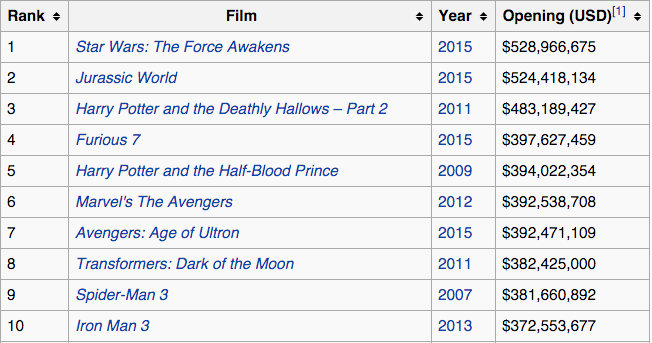
—oh.
All of these movies are wish-fulfillment, not through content, but through structure. Exposition, rising action, climax, falling action, dénouement; great power, great responsibility, triumph. The arc is older than the Odyssey, but modern media has perfected the formula. The heroes are like us, the villains are like them. We get precisely the stories we want to hear.
At the least, every Westerner under the age of 25 is a fantasist. You may see the adulation of John Cena or Biggie Smalls as somehow different than the worship of Batman or Deadpool. I do not.



With age and maturity, the stories become grounded in realism, but the basic tropes remain the same. Mainstream liberals caricature the Koch brothers as supervillains, Trump’s supporters see him as an Eastwood antihero, social justice kids imagine themselves as a ragtag band of heroes fighting against the Empire. (The overlap between social justice and fandoms is not a coincidence.) Nerds may have outlandish fantasies, but not much worse than everyone else.
Let’s try a different tack.
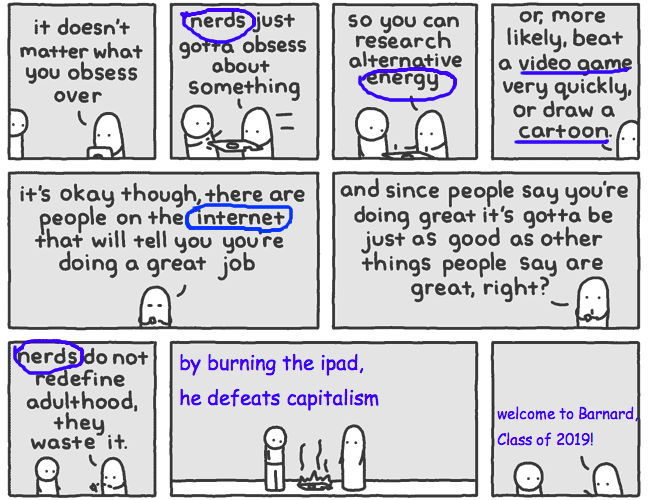
The (unedited version of the) above comic is used as a motte and bailey. Motte: “Nerds just gotta obsess over something.” Bailey: “Nerds play videogames, have no friends, and waste adulthood on the internet.” Subtext: “Those guys are lame, not us.” Come on. “A nerd is a nerd is a nerd” — Nerdtrude Stein. Do you think going into debt for your film studies degree makes you less complicit in the system? Are you really less dependent on outside praise? “I don’t support Wall Street, I spend all my money on pot.” You’re an inspiration to us all.
But we’re getting closer. “Nerds just gotta obsess over something.” If you browse a powerlifting forum and stumble upon a post that begins, “My journey begins in 1995, when, while enjoying the fruitful harmonies of Beethoven’s 9th, I began to contemplate…” you can rest assured that no amount of myofibrils will get that guy laid. There are nerds who obsess over cooking, cars, pets, makeup, drugs, history, and fashion, and they all sound the same. If you accuse someone of “nerding out”, you’re claiming that they are using excess detail in a way that detracts from the underlying meaning.
In other words: “Show, don’t tell.”
System 1 operates automatically and quickly, with little or no effort and no sense of voluntary control.
System 2 allocates attention to the effortful mental activities that demand it, including complex computations. The operations of System 2 are often associated with the subjective experience of agency, choice, and concentration. (Source)
In Thinking Fast and Slow, Daniel Kahneman argues that two distinct modes of thought—fast and slow, System 1 and System 2—are used to process the world. Our default mode is the heuristic-based System 1: unconscious pattern recognition and scripted response. Kahneman’s book is a compendium of the ways System 1 can fail: anchoring effect, availability heuristic, attribute substitution, loss aversion, framing effect, sunk cost fallacy, etc. He’s not wrong. System 2 is good at math. If someone hands you a Scantron and puts a gun to your head, you should take your time, question your biases, and quantify, quantify, quantify.
However.
The improviser has to realise that the more obvious he is, the more original he appears…Ordinary people asked to improvise will search for some 'original’ idea because they want to be thought clever…If someone says 'What’s for supper?’ a bad improviser will desperately try to think up something original. Whatever he says he’ll be too slow. He’ll finally drag up some idea like 'fried mermaid’. If he’d just said 'fish’ the audience would have been delighted. (Impro)
Rather than do what comes naturally, a bad improviser tries to do what is “best.” It never works. It’s too slow, and even if it wasn’t, a try-hard idea will seem out of place, breaking character, breaking flow.
Thinking Fast and Slow picks questions that fit its conclusion. Yes, System 2 is superb at solving short, quantitative problems. But what if you have massive changing input and it’s not clear what variables are important? What you have information gaps and limited time to act? What if you don’t have any numbers at all? What if you don’t even know how to define the problem?
System 2 makes you a bad actor, and nerds overuse System 2. The same type of thinking that makes nerds “interested in physics” is responsible for their klutziness, neurosis, and low status. And if I needed a word to describe this worldview, it would be “rationalism.”

The post-industrial world needs rationality. It’s not a coincidence that the nerd archetype has grown with Moore’s Law [11]. Rationality has made us successful—I am grateful for our advancements in engineering and medicine—but rationalism, as a worldview, demands a sacrifice.
You’ll hate me, but your rationalism is inseparable from your anxiety [12]. Anxiety asks only one question: “What am I supposed to do?” You know the rules with your friends, but you’re lost with strangers or in groups. So you freeze up and try to calculate the best option, but this never works, there are too many variables, and even if the punchline is good the delivery will be off [13]. People invented small talk for this reason, but rationalism hates rituals: “This is pointless. We can do better.” Ironically, when you find a tribal artifact molded in plastic, painted in neon, and sold in the gift shop, you think: “This isn’t authentic at all.” Right, it’s trying so hard to please that it looks fake. Huh.
Your anxiety continues outside of social interaction, as you wonder what you’re supposed to do with the day, with your life. Such questions are unanswerable, so you do nothing, and that feels awful too. The anxiety only stops when you commit to a task, something with a beginning and end, and do it. Ideally, this would be something productive, but after two hours of editing and de-editing the commas of your unfinished novel, you give up. Have a breakdown, call Mom, overeat, spend an hour searching for the “right” porn clip, Facebook, Tumblr, swipe left, sleep. The activities aren’t the point. The point is not having to think.
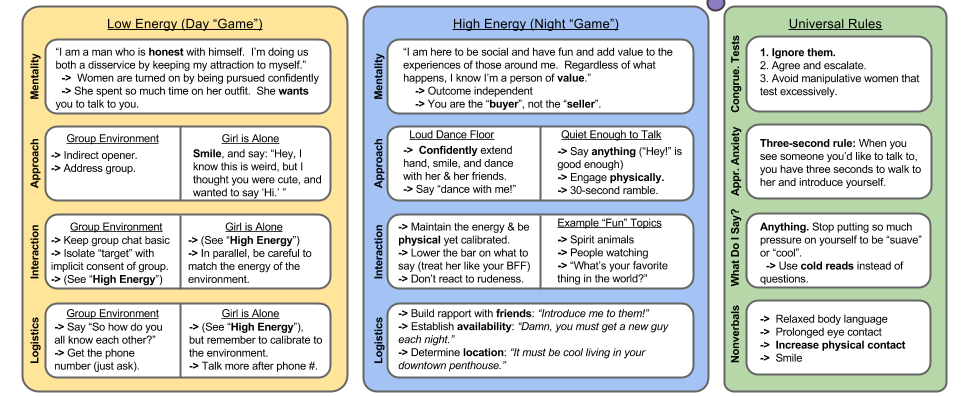
Pick-up artists (and similar masculinists) attempt to System 2 their way out of a System 1 problem, like the world’s most advanced chatbot.
Does this work? Certainly, approaching more women gives you better odds, and yes, you should brush your teeth and lose the sideburns, but if you consider that “seduction advice” then you have my condolences. It can’t be have been easy growing up without a father.
I don’t know of any randomized controlled trials comparing true to sham pick-up advice, but my impression is that a large fraction of PUAs fail early and give up, as evidenced by the slew of ex-PUA sites. People who stick with the game long enough do succeed, but only when the pick-up tricks stop being tricks. System 2 won’t get you laid, but if you execute an algorithm enough times it becomes automatic, i.e. it gets absorbed into System 1, i.e. you become the character you were pretending to be.
And, like any character, some people will like it and others won’t. The classic knock against pick-up artists is that they “manipulate women to get sex.” How? If you walk up to a woman and criticize her nostrils, will this somehow fool her into thinking you’re a nice person? I used to live with a PUA guy—programmer/chess player, incidentally—and some women, upon meeting him, would immediately decide that he was a skeez, possibly syphilitic. Other women found him charming. PUA tips are marketed to specific audience: the lonely sophomore in the corner of the room staring at the drunk undeclared masses. PUA tricks work to score with those girls, but not because they’re tricks: that’s just what some girls are into. And if those girls are your type, have fun. I hope you like talking about spirit animals.
But it probably won’t make you happy. Most PUAs don’t obsess over status and seduction because they want to have more sex (which would be totally reasonable.) They want to have had more sex. They want a bigger number.


Rationalism is at the core of the rating game. An old-school chauvinist says, “She’s fat and ugly,” a rationalist says, “6/10, nice thighs, forehead is too big.” The former is an opinion, the latter seems like a fact: “Something is wrong with me that can never be fixed.” I know, I know. The people who give these ratings don’t have necessarily ill intentions, they just see the world as something to be optimized. This winds up hurting them as well: “I’m worried she won’t like my, uh, 2D:4D ratio. I mean, it’s above average, if I measure with the curve—” And so on.
Narcissism is a defense against rationality: you remake the scale so you are always at the center. It works, except your inability to fail robs you of the ability to succeed. It works, until you encounter anyone who doesn’t accept your ever-changing values as gospel. Then you doubt yourself, panic, turn to religion, “Give me a sign!”, or rationalism, “Give me a number!”, anything external that can affirm your value. Pacified, you return to the status quo.
We care about measurement and any trait can be measured; the scale starts at 0 and it goes to 10. But even if you were a 10, you would feel unhappy. Even if you mastered every mutually exclusive skill, you would feel weak. The universe is simply more powerful than you are. If you see existence as a set of misaligned atoms, you are guaranteed to lose. Your petty victories will always be overshadowed by petty defeats: aging, boredom, constipation, hard-to-open packaging, and the immeasurable frustration of needing other human beings.

And so.
Narcissists vacillate, rationalists obsess, but they have the same basic problem: an inability to stick to the script. The solution is to pick a character, write down your values, and commit. Sometimes, you will fail. It will suck. But the doubt will stop. You will have something real that tells you if what you’re doing is right. You will know when you are winning.
VI.
The four most common pieces of dating advice are “Be confident”, “Be yourself”, “Be confident in yourself”, and possibly “Be yourself, but confident.”

Thanks for the tip. Maybe you should do a TED talk.
Sometimes the advice is a bit more nuanced: “Suck in your belly, puff out your chest, stand up straight, speak from the diaphragm, take up space, steady your head, don’t smile. And look natural.”
This is a good description of what high status people look like. It’s also terrible, System 2 advice. It’s too many variables to hold in your head at once. You can sustain maybe two of the above actions while consciously thinking about them, even less if you have to, you know, “interact with other human beings.”
On the other hand, if you decide to act like a confident character, you will take on all of the above high status markers without even trying.

I was pretty neurotic in my late teens. I took every precaution to avoid doing something wrong.
-
I could not touch a girl unless a) she had touched me in exactly the same way, or b) she had granted me verbal permission.
-
I could not, under any circumstances, compliment a girl’s body. Even a generic “You’re beautiful,” counted as objectification.
-
I could not joke or talk about sex in any way, as this might constitute harassment.
-
Certain words were forbidden: “pussy”, certainly, but even “chick.” My dirty talk was a light PG-13.
-
I never teased. I didn’t want to hurt anyone’s feelings.
Some of this was scrupulosity, some of this was simply cowardice. Because I wanted it to be an ethical stance, I treated men the same way.
It was totally insane, but when I read the comments on posts like these, it seems that this sort of insanity is not unique. Rationalists follow a set of rules they don’t really believe in, then wonder why they don’t feel powerful.
My redemption, I think, was when I realized that the words didn’t matter.
On dates, we’d walk through an outdoor mall and joke about the stores and people. I couldn’t compliment her physical features, but I could compliment her clothes and style. I couldn’t tease her, but it turns out saying “Oh, you would like X” gets the same blush and giggle. As long as a conversation has the tone of small talk, it is. Night would fall. We’d start talking more honestly about ourselves. I’d pick a bench, we’d sit down, and I’d say: “So, wanna make out?”
This worked, over and over again. Why wouldn’t it? That’s a perfect end for the quirky Annie Hall date we’d been on. If she wasn’t into that sort of date, she wouldn’t have gone out with me in the first place.
Sometimes girls would tell me, “You’re so confident,” and I would be amused. But I did feel confident. I even looked confident: body language, voice, the works. I had practice playing this character. I didn’t even have to try.
“Jeez, Portnoy. You plotted this all out?” No, I realized it in distant retrospect. If you try to copy my teenage moves, you will fail, because it will be fake. No one over the age of nineteen can or should be a Manic Pixie Dream Boy. Be a man. That doesn’t mean act like Don Draper—Jerry Seinfeld had way more success—it means know how you appear to the world.
On the internet and in life, I meet a lot of people who have given up. “I’m not X, therefore I can’t Y.” You know, part for the whole. But man, no one thing is ever that important. And if this essay has a clean conclusion, it’s that nobody cares about most of what you say or do. They care about the prototype you communicate. They care how you fit into their story. You are the only who pays attention to your details.
If you do not feel attractive, work to become your nearest prototype. The nice thing about Halloween is that there’s a sexy version of every costume. You can’t sustain “be confident”, but you can become confident. Get older. Level up in your chosen class.
You don’t have to have confidence in asking your crush out, you have to have confidence in yourself, even if that means—weirdly—that you have confidence in the fact that you’re not confident.
I wish you the best of luck.
Footnotes
Don’t get me wrong, wide hips (or, upstream, high estrogen) may increase fertility and thus be selectively advantageous, but this has nothing to do with the male gaze. If you don’t get this, please take a break from this essay and come back when you’ve finished Hooked on Phonics.
Retrospective studies, as well as prospective studies that follow children through to adulthood, are in agreement: Children who eventually become gay are different, at least on average, from those who become straight. Pre-gay children are, to a variable extent, atypical or nonconformist in a number of gender-related traits, meaning that these traits are shifted towards the norms for the other sex, as compared with children who grow up to become straight.
It is difficult to explain these [personality] shifts in gay people as the result of being gay. Rather, it seems likely that they reflect differences in the early sexual development of the brain, differences that affect a “package” of gendered psychological traits including sexual orientation. (Source)
Conversations about weightlifting do not violate the bro code because physical strength is seen as a) obtainable (“I could get that way if I wanted to”) and b) not a meaningful measure of power (“He’s tough, but my lawyers could take him.”) This defense collapses when a guy shoves you in the bar, or in any other direct challenge, e.g. arm-wrestling with a girl present. (Note that guns are the ultimate identity-preserving trump card: “You may be on the winning side of the past 70 years of cultural warfare, but I could kill you dead.”) ↩︎
Evo psych fanboys like to invoke hormones, namely that the female brain can’t handle them, we never should have given them the right to vote, etc., but the evidence for a mate-choice effect of ovulation (e.g. preferring high testosterone mates) is very weak. Even if it was real, the effect would be minimal: you can’t smell for shit in the club, and women do not go around taking blood samples to find the highest androgen/mL. Low T is only a problem insofar as it influences behavior: an anabolic steroid addict biting his nails and looking at the floor is as seductive as anyone else humming Mad World. Same goes for women/estrogen. Only Pfizer employees are turned on by thrombosis risk alone. ↩︎
Indeed, most arguments of evolutionary psychology disintegrate if you look at them for more than five seconds and are not currently high on nitrous. Evolution acts primarily on DNA. There are only 20,000 genes in the human exome. Do you really think a subset of them encodes a preference for big butts and the inability to lie? For 0.7 over 0.6 or 0.8, starting at puberty but not before? What do those proteins look like? ↩︎
This definition of power (“ability to control the universe”) is broad and metaphysical, I am aware. However, it explains why controlled pain—pinching yourself, cutting, sad music—can be pleasant, while uncontrolled pain is not. It explains why ritual (prayer, but also nailbiting) makes us feel less anxious. It also explains why turning off the forebrain—huffing paint, heavy alcohol use, inhaling CO2—feels good. The less variables you have to consciously contend with, the more you feel in control. ↩︎
We find people “creepy” when they miss one of these developmental steps. The evil child archetype of horror movies is a kid who “doesn’t get” how to be nice, the stalker/serial killer archetype is an adult who refuses to play the normal games of status (e.g. Norman Bates). A lunatic in a hockey mask is scary but never creepy: “Yes, he wants to kill teenagers with a machete—but let’s be honest, we’ve all been there.” ↩︎
In grade school, kids that politely and cheerfully signal low status can wind up weirdly popular. (“You’re, like, the school mascot!”) It’s when a low status kid infringes on high status territory—asking too many questions during class, flaunting his niche interests—that bullying tends to occur. ↩︎
When porn uses the label “slut”, it’s not (always) intended as misogyny. It’s a reminder: “This is what you are supposed to want.” I do not say this in defense of porn. ↩︎
The internet loves stories about burn victims (always male) who wind up with hot wives, but severe-enough deformity actually helps your odds: once you fit the Heroic Survivor prototype, physical attractiveness becomes besides the point. (For the same reason, scars look better on a bouncer than a ballerina.) ↩︎
With regards to attraction, normal = good, but note that prototypes are not necessarily the average of a subculture’s real-world members: the “prototypical” athlete is a really good athlete, for example. ↩︎
This is sometimes incorrectly described as “identity.” To be clear: identity as “chosen, untestable self” is a fake idea, I love Halloween but it won’t bring a paycheck. Contrast with image, “the way you appear to everyone who knows you,” which has consequences that are painfully real. ↩︎
Men and women are equally likely to be fantasists, but rationalists are mostly male. Arguments about “fake geek girls” seem to hinge on this point: plenty of women play Mass Effect, but few play Dwarf Fortress and other data-heavy narrative-light games. Rationalism at least partially accounts for the male majority in engineering, surgery, etc. ↩︎
cf. a rabid grizzly bear in your kitchen, which induces fear, not anxiety. Fear is a conditioned reflex: it is System 1, pre-thought. PTSD patients often have a fear response to social interaction, but this is distinct from anxiety and benefits from different treatment. (Also, fear is often correct. “I have a bad feeling about this” is different than “I’m worried about this”, and you know it.) ↩︎
Conversely, unfunny jokes can get uproarious laughter if they are delivered with a joke’s cadence = “social humor.” Talk show hosts make a killing off this. (System 2 prefers “plug and chug” humor, e.g. puns, where you iterate prefixes until you find one that works.) ↩︎